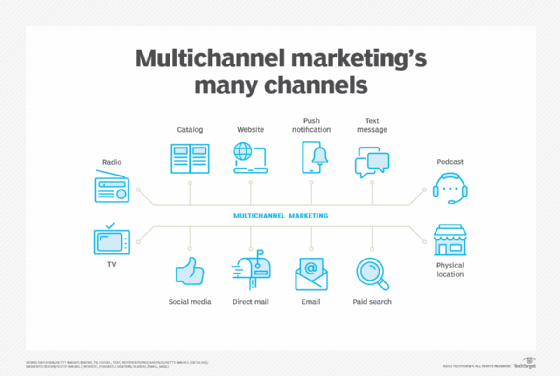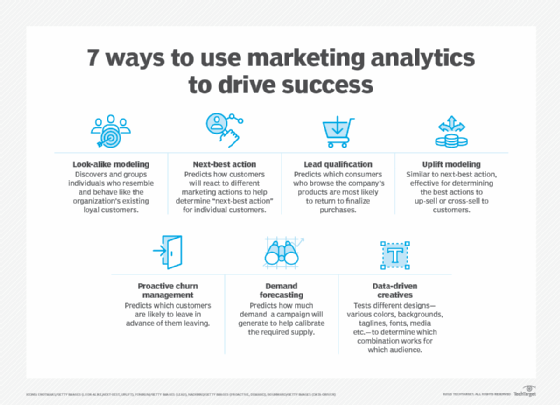marcom (or marcomm)
What is marcom (or marcomm)?
Marcom (sometimes spelled "marcomm") is an abbreviation for "marketing communications." Marcom is targeted interaction with customers and prospects using one or more media, including both print advertising and internet-based marketing channels.
Media channels in marcom
Historically, marcom included more traditional media such as direct mail, newspapers and magazines. These modes of communication allowed businesses to disseminate their messages to a broad audience.
As the marketing landscape expanded, so did the list of marcom channels. Television and radio advertisements emerged as significant modes of marketing communication, reaching out to consumers right in their homes or vehicles.
However, it would be an oversimplification to restrict marcom to these channels alone. Over time, outdoor advertising mediums like billboards and transit advertisements have also been integrated into marcom strategies, becoming essential in capturing the attention of potential customers on the move.
The advent of the digital age has significantly reshaped the marcom landscape. Digital channels, such as email marketing, social media, websites, as well as digital marketing and advertising, are now paramount components of modern marcom strategies. These online channels provide an opportunity for businesses to reach their target audiences in a direct, personalized and interactive manner.
Integrated marketing communications: A multichannel approach
Modern marcom is characterized by an integrated approach that combines several media channels to deliver a consistent, clear and compelling message about a company and its products or services. This multichannel approach, known as Integrated Marketing Communications (IMC), is crucial for gaining maximum impact from marketing efforts.
An effective IMC strategy ensures that all corporate communication strategies, advertising and promotional activities, and all marketing channels are linked and work together in harmony. The goal is to ensure that all messaging and communication strategies are consistent across all channels and are centered on the customer.

The benefit of marcoms
At its core, marcom is about connecting with customers. It's about understanding their needs and preferences and communicating how a product or service can fulfill these needs.
Marcom not only informs and persuades but also builds relationships. It fosters dialogue and encourages engagement, enhancing the customer's experience with the brand. Moreover, with the use of data analytics, businesses can tailor their marcom strategies to the unique needs and preferences of different customer segments, further enhancing their effectiveness.
In essence, marcom is no longer just about selling products or services. It's about delivering value, fostering relationships and enhancing customer experiences. It's about telling a compelling brand story consistently across all touchpoints that engage customers and prospects.
In the ever-competitive business environment, effective marcom strategies have become integral to business success. They provide a way for businesses to stand out, resonate with their target audience and ultimately, drive growth and profitability. So, whether it's a single approach or an integrated multichannel campaign, marcom plays a crucial role in shaping a brand's presence in the market.
The future of marcoms
As we look ahead to the future of marcom, two trends stand out: personalization and digitization. As customer expectations evolve, businesses are being pushed to deliver more personalized experiences.
This personalization isn't restricted to just product offerings; it extends to the communications that businesses have with their customers. Customers now expect messages that are relevant to their needs, preferences and past interactions with the brand.
Thus, the future of marcom will see businesses using data analytics, machine learning (ML) and artificial intelligence (AI) technologies to understand their customers better and deliver highly personalized marketing messages. This personalized approach to marcom is not just about enhancing the customer experience; it's also about maximizing the efficiency of marketing efforts by reaching the right customer, with the right message, at the right time.

Moreover, the future of marcom will be digital. The digital age has revolutionized how businesses communicate with their customers, and this trend is set to continue. Channels like social media, mobile marketing and content marketing will continue to dominate the marcom landscape.
But beyond these, emerging technologies such as virtual reality (VR), augmented reality (AR) and the internet of things (IoT) will open up new possibilities for engaging with customers. These technologies will provide new platforms for delivering immersive and interactive experiences, transforming how businesses tell their brand stories.
Learn about the different types of SMS marketing and see six customer retention best practices for businesses to heed. Explore five real-world multichannel marketing examples.
